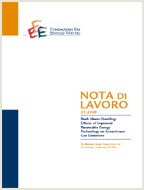Adapting to Climate Change: An analysis under uncertainty

28.01.2016
David García-León (University of Alicante)
C61, D58, D90, O44, Q01, Q54, Q56
Climate Change, Adaptation, Mitigation, Dynamic Programming, Uncertainty, Integrated Assessment, DICE
Climate Change: Economic Impacts and Adaptation
Francesco Bosello
Climate change is a phenomenon beset with major uncertainties and researchers should include them in Integrated Assessment Models. However, including further dimensions in IAM models comes at a cost. In particular, it makes most of these models suffer from the curse of dimensionality. In this study we benefit from a state-reduced framework to overcome those problems. In an attempt to advance in the modelling of adaptation within IAM models, we apply this methodology to shed some light on how the optimal balance between mitigation and adaptation changes under different stochastic scenarios. We find that stochastic technology growth hardly affects the optimal bundle of mitigation and adaptation whereas uncertainty about the value of climate sensitivity and the possibility of tipping points hitting the system change substantially the composition of the optimal mix as both persuade the risk-averse social planner to invest more in mitigation. Overall, we identify that including uncertainty into the model tends to favour (long-lasting) mitigation with respect to (instantaneous) adaptation. Further research should address the properties of the optimal mix when a stock of adaptation can be built.
***
Suggested citation: García-León, D., (2016), ‘Adapting to Climate Change: an Analysis under Uncertainty’, Nota di Lavoro 10.2016, Milan, Italy: Fondazione Eni Enrico Mattei
